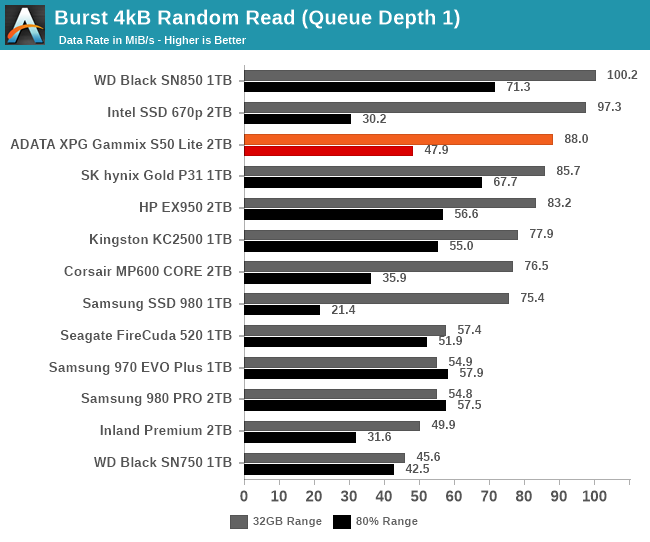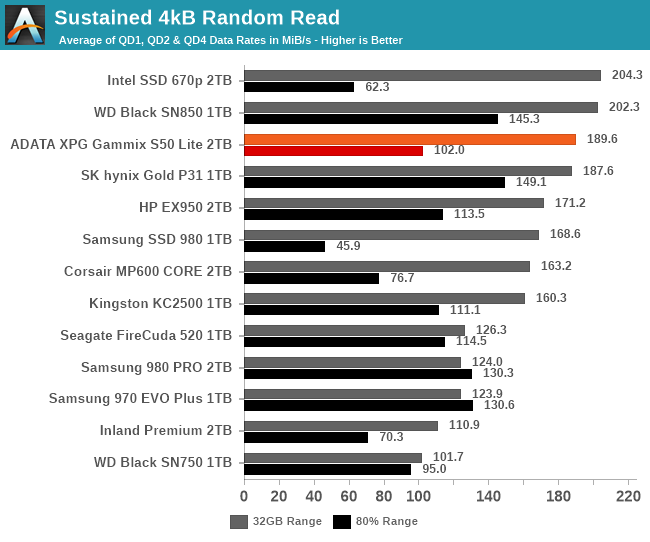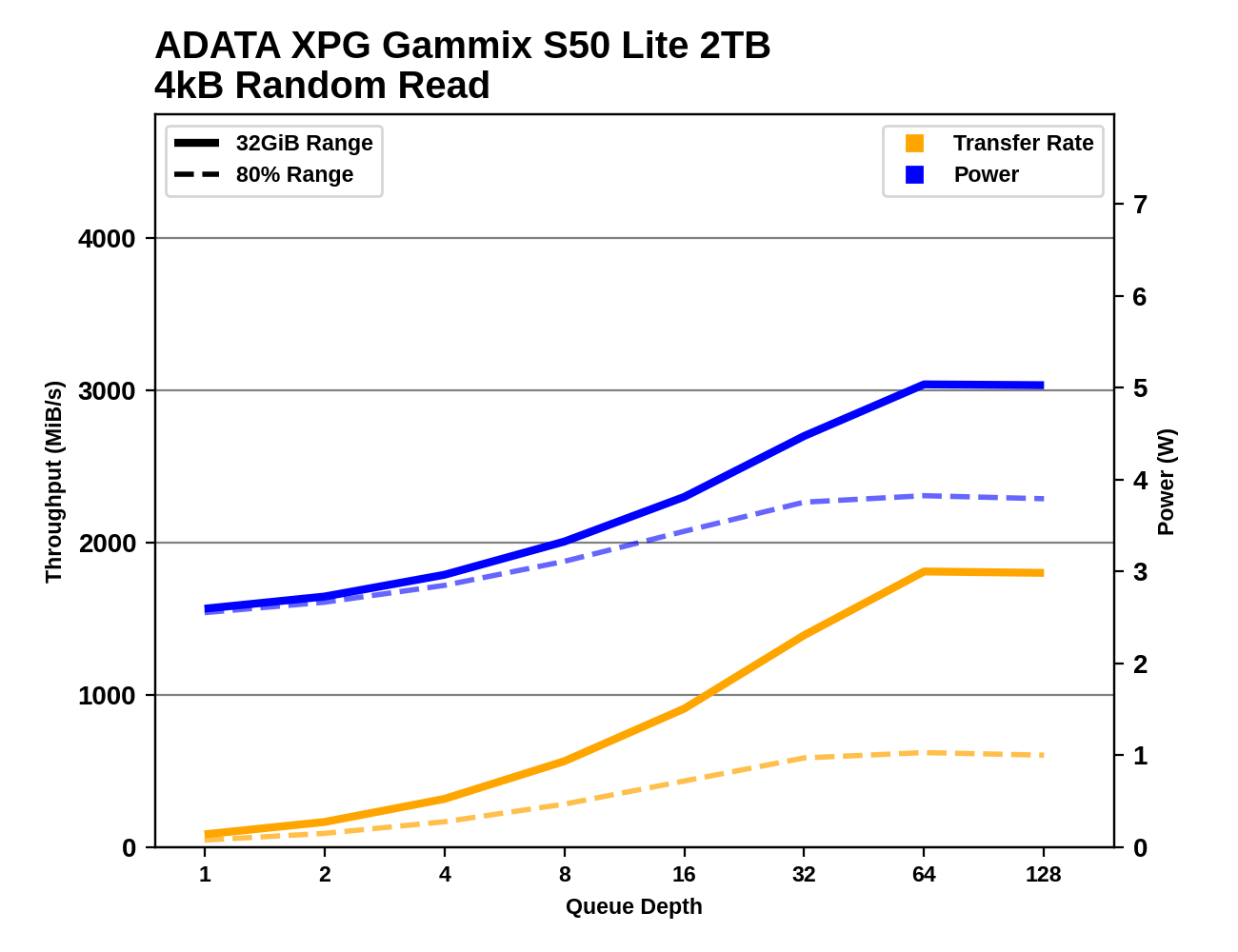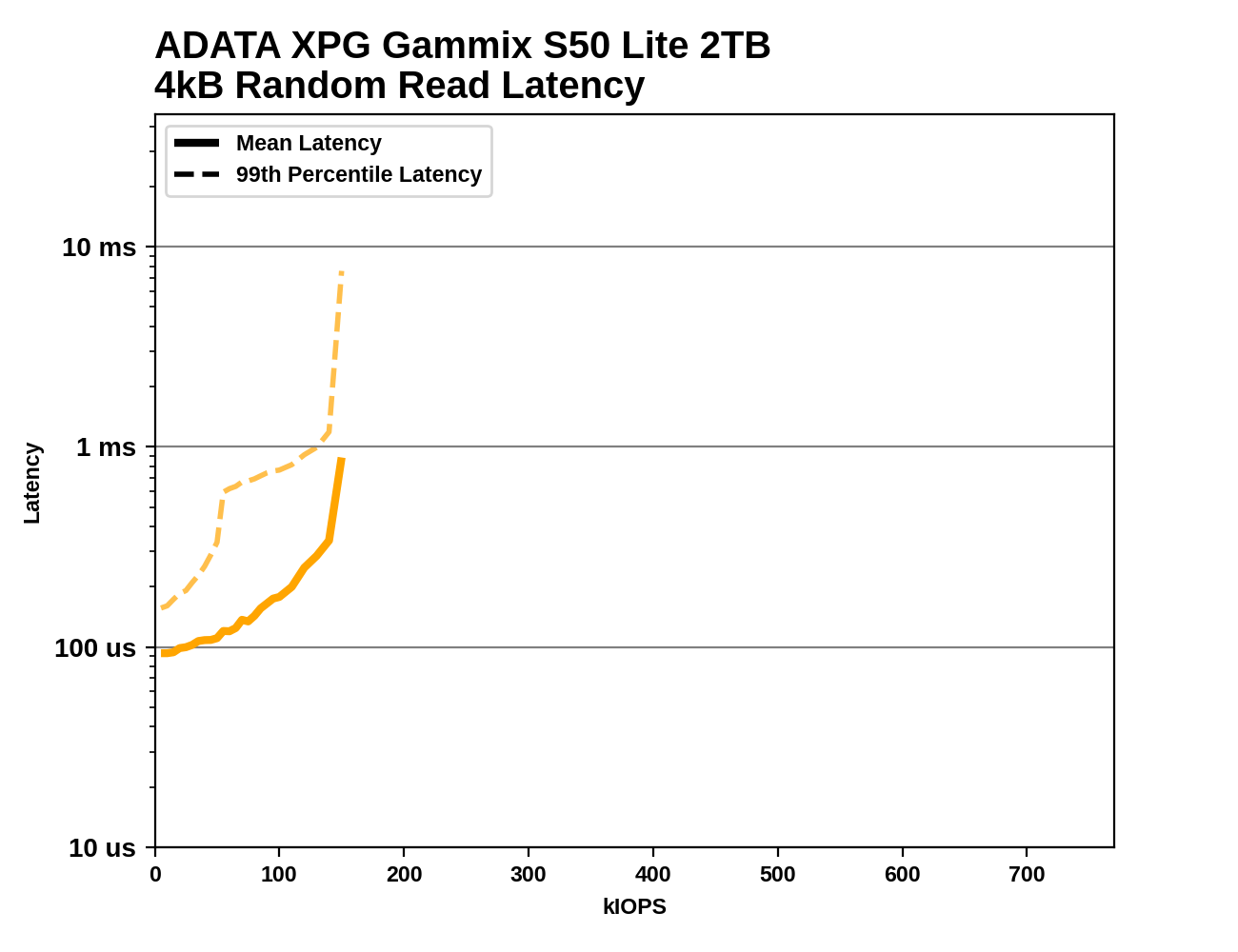The ADATA GAMMIX S50 Lite 2TB SSD Review: Mainstream PCIe Gen4
by Billy Tallis on April 30, 2021 8:00 AM ESTBurst IO Performance
Our burst IO tests operate at queue depth 1 and perform several short data transfers interspersed with idle time. The random read and write tests consist of 32 bursts of up to 64MB each. The sequential read and write tests use eight bursts of up to 128MB each. For more details, please see the overview of our 2021 Consumer SSD Benchmark Suite.
 |
|||||||||
| Random Read | Random Write | ||||||||
| Sequential Read | Sequential Write | ||||||||
The ADATA XPG Gammix S50 Lite performs well on most of the burst IO tests, especially when the test is confined to a narrow range of the drive so that it won't overflow the SLC and DRAM caches. When the test ranges over 80% of the drive, the S50 Lite's write speeds are much lower (due to less available SLC cache) and the random read performance is also a bit lower (due to insufficient DRAM).
Sustained IO Performance
Our sustained IO tests exercise a range of queue depths and transfer more data than the burst IO tests, but still have limits to keep the duration somewhat realistic. The primary scores we report are focused on the low queue depths that make up the bulk of consumer storage workloads. For more details, please see the overview of our 2021 Consumer SSD Benchmark Suite.
 |
|||||||||
| Random Read | Throughput | Power | Efficiency | ||||||
| Random Write | Throughput | Power | Efficiency | ||||||
| Sequential Read | Throughput | Power | Efficiency | ||||||
| Sequential Write | Throughput | Power | Efficiency | ||||||
Adding in some slightly higher queue depths and longer test durations doesn't substantially change how the S50 Lite ranks. Its peak performance is still competitive with the best PCIe Gen3 drives, but as the drive fills up and the locality of the workload drops, it loses more performance than those 8-channel Gen3 drives with the full amount of DRAM.
The power efficiency score on these tests generally look better for the S50 Lite than the energy usage scores from the ATSB tests. Its efficiency is generally at least middle-of-the-road except in the situations where performance starts seriously dropping.
 |
|||||||||
| Random Read | |||||||||
| Random Write | |||||||||
| Sequential Read | |||||||||
| Sequential Write | |||||||||
Looking across the full range of queue depths shows the same performance patterns for the S50 Lite continuing and amplifying. Except on the sequential read test, the S50 Lite shows huge performance disparities between the narrow 32GB range test runs and those that cover 80% of the drive. The lower DRAM ratio is a handicap on the random read test, and the SLC cache often overflows when testing writes against an 80% full drive. But when the tests are only covering a small slice of the drive, the S50 Lite shows good performance scaling that is comparable to the best gen3 drives.
Random Read Latency
This test illustrates how drives with higher throughput don't always offer better IO latency and Quality of Service (QoS), and that latency often gets much worse when a drive is pushed to its limits. This test is more intense than real-world consumer workloads and the results can be a bit noisy, but large differences that show up clearly on a log scale plot are meaningful. For more details, please see the overview of our 2021 Consumer SSD Benchmark Suite.
 |
|||||||||
The ADATA S50 Lite starts out with decent random read latency at low loads, but the 99th percentile latencies climb quite a bit during the early part of the test. The S50 Lite ultimately fails to make it to the high IOPS range we expect from such a drive, and instead loses control of its latency around 150k IOPS—behavior that's more fitting of a QLC drive.










93 Comments
View All Comments
Dizoja86 - Saturday, May 1, 2021 - link
I was also confused about that. The price seems fair for the performance.Dizoja86 - Saturday, May 1, 2021 - link
Really hoping to see that S70 review soon. From the SSD recommendations for this month, it sounds like it's in the works.Billy Tallis - Saturday, May 1, 2021 - link
I'm currently wrapping up testing of the most recent Innogrit firmware available. Over the weekend I'll be re-testing the 980 PRO with Samsung's newest firmware. Once those tests are complete, I plan to write up my Phison E18 review first, then the ADATA S70.Scour - Sunday, May 2, 2021 - link
Would be nice :)Dug - Wednesday, May 5, 2021 - link
From looking at others like storage review, I wouldn't even be looking at that drive.Nexing - Saturday, May 1, 2021 - link
'we had originally speculated that the SM2267 controller might allow the S50 Lite to be the first Gen4 SSD suitable for laptop usage (hoping for similar power efficiency to the SK hynix Gold P31)'What about?
Sabrent 1TB Rocket 4 Plus NVMe 4.0 Gen4 PCIe M.2 Internal SSD Extreme Performance Solid State Drive (SB-RKT4P-1TB)
Billy Tallis - Saturday, May 1, 2021 - link
The Rocket 4 Plus is a Phison E18 drive. That's an 8-channel controller designed for maximum performance. That kind of goal usually leads to mediocre power efficiency at best. And our testing shows that the E18 doesn't even have great efficiency among current top of the line Gen4 controllers. For example, an E18 drive against the WD Black SN850 loses in all but one of the efficiency scores: https://www.anandtech.com/bench/product/2783?vs=27...And against the SK hynix Gold P31, the E18 drive loses very badly on efficiency, with the P31 typically getting somewhere around 3x better performance per Watt: https://www.anandtech.com/bench/product/2783?vs=27...
You might be able to run an E18 drive in a laptop, but the extra performance isn't going to make anything feel noticeably faster, and if you have a heavy storage workload that might come close to making use of the drive's theoretical performance, then its poor efficiency will start to have an impact on battery life.
Scour - Sunday, May 2, 2021 - link
I think thermal throttling in laptops could be a big problem if using high performance NVME-SSDsTheinsanegamerN - Monday, May 3, 2021 - link
Well duh.Linustechtips12#6900xt - Monday, May 3, 2021 - link
laptops have one big issue, thermal performance, and we have seen let's just call "optimistic" ways of cooling down our silicon chips there will always be problems with thermals and desktops will always be faster just because of thermals period simple as that, I do realize this is very like probably not right in the sense desktops will always outperform laptops but for the foreseeable future, I believe it to be true.